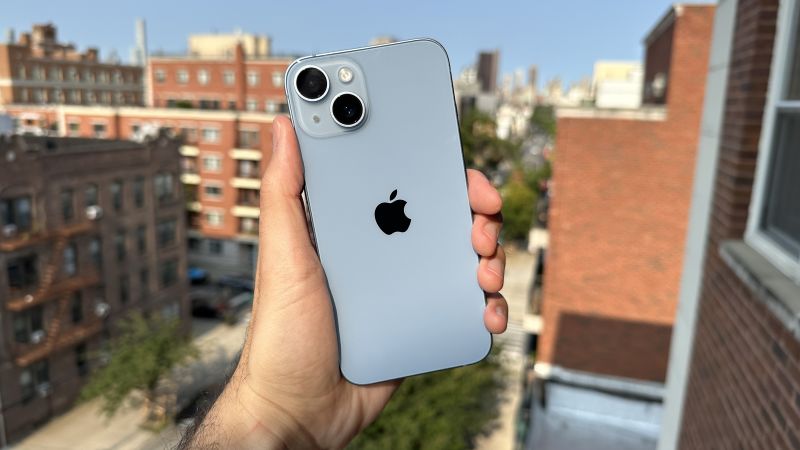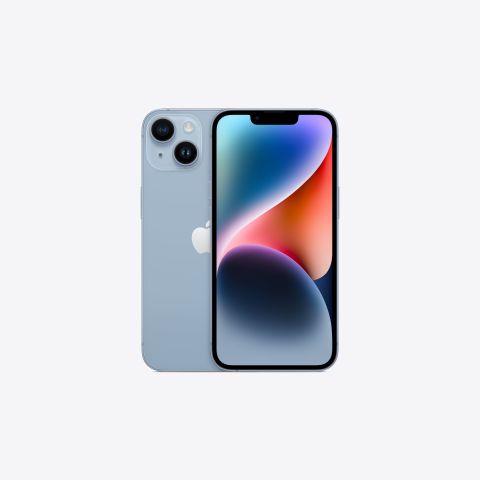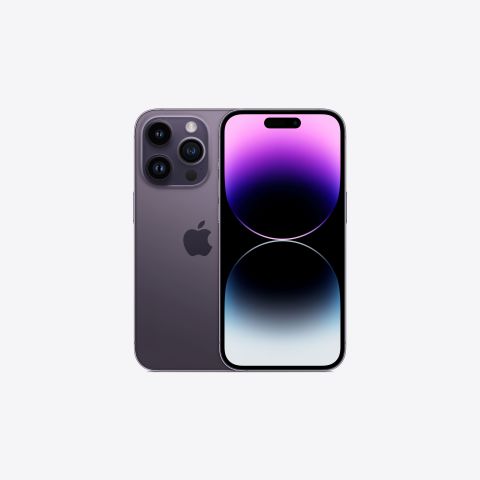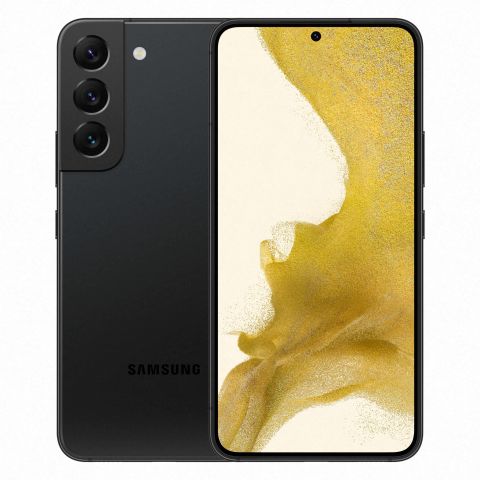The iPhone 14 is officially here, and the story is more of the same. Apple’s latest smartphone is both the best new iPhone for most people ready to upgrade, and a pretty iterative improvement that owners of last year’s model can skip. But if you fall into the former camp, you’ll find a lot to love here.
The iPhone 14’s big changes include an improved camera system with some especially great video tricks, as well as a range of handy safety features that could someday save your life. When you couple that with the beautiful design, great display and long battery life that we’ve come to expect from the entry-level iPhone, you’ve got a great $799 device for first-time iPhone buyers — or those who haven’t upgraded in a few years.
But is the iPhone 14 the right fit for you? I spent a week using it as my main handset — playing games, hopping on calls and taking tons of pictures in the process — to help figure that out.
The best iPhone for most people
The iPhone 14 is the best new iPhone for most people, particularly if you’re coming from an iPhone 12 or older. Those willing to invest in a more significant upgrade should go with the iPhone 14 Pro.
Same great look and feel
The iPhone 14 looks and feels a whole lot like last year’s model, and that’s not entirely a bad thing. As someone who typically uses the chunkier Pro models, I love how much lighter the 6-ounce iPhone 14 is — it’s the kind of device that feels great to pick up and hold. And while its aluminum design isn’t quite as strong as sturdy as the stainless steel iPhone 14 Pro, it certainly doesn’t feel cheap. The iPhone 14’s 6.1-inch frame was the perfect size for my hands and kept me comfortable throughout long hours of social media scrolling, though folks who want something bigger can hold out for the 6.7-inch iPhone 14 Plus coming on Oct. 7.
The standard iPhone also remains beautiful, with aluminum edges and a glass rear panel that create a stylish two-tone aesthetic. I especially appreciate the Blue model I’ve been testing out, though you can also pick the phone up in Purple, Midnight, Starlight and the usual, extra-bold (Product) Red variation if those are more your thing. Just be sure to grab an iPhone 14 case for this phone — that shiny glass panel is a major fingerprint magnet.
Great cameras that shine in low light — and on video
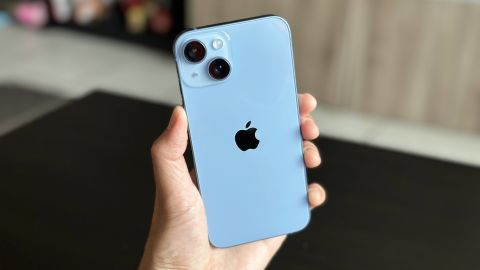
The iPhone 14 has an upgraded dual-lens camera system that’s enhanced by some fancy new software magic called the Photonic Engine. Instead of bogging you down with every single spec, I’ll make it simple: the new iPhone is designed to capture wider, more detailed photos (particularly for moving subjects), offers improved flash, promises far better low-light photography and can even auto-stabilize your shaky videos. In real-world use, this all translated to a camera that was a joy to use during my daily adventures — even if it didn’t always feel like a massive leap over the iPhone 13.
Apple’s latest iPhone was predictably great in well-lit outdoor settings, taking vibrant and color-accurate shots of New York’s East River that captured the sun’s reflection on the water without making things look blown out. The copious portrait mode shots I captured of my dog looked professional and packed with detail, effortlessly blurring the background out while keeping the focus on her unamused face. From a distant shot of a large orange sculpture to a close-up of green leaves that let me see every single vein, the iPhone 14 excelled at both distant and intimate shots of outdoor scenery.
But that’s the easy stuff. I was far more impressed by the iPhone 14’s stellar low-light performance, which captured more detail than a phone has any right to — all in minimal to no light. The photos I took of a plate of Mexican food under dim restaurant lighting looked good enough to eat, and the colors of a red, white and blue-painted boat popped gorgeously against the black night sky. When I shot into what looked like complete darkness while walking along a river, I was blown away to see a photo with a highly visible sky, water and distant land that looked like it was captured in the early evening. I didn’t immediately notice a huge difference when comparing this shot across my iPhone 14 and iPhone 13 Mini, but the newer iPhone did create a slightly clearer, wider picture — likely thanks to that new ultrawide lens. Apple’s new iPhone also fared well against the Samsung Galaxy S22+ in low light, capturing outdoor signage and greenery more clearly and prominently during an evening stroll around a busy street.

Since we’re not going to stop FaceTiming and creating TikTok videos anytime soon, Apple upgraded the front-facing TrueDepth camera with autofocus for keeping your face sharp from any distance and a faster aperture for better low-light shots. Even with those upgrades, the selfies I took on the iPhone 14 and 13 looked practically identical, with both phones capturing my slightly sunburned skin and every tiny strand of my scraggly beard. The Galaxy S22+ beat out both phones in terms of sheer detail, but also had a colder color temperature that looked less true to life. Low light and portrait selfies on the iPhone 14 were likewise great, though you’re likely going to benefit most from the new front camera if you take lots of group shots.
One of the iPhone 14’s biggest camera upgrades can be found in the video department, thanks to a new Action mode that’s designed to keep your videos stable even as you’re capturing some fast-moving action (such as sports) — or are in the middle of some yourself. I tested this feature while taking a brisk walk around my neighborhood — intentionally letting my phone bounce around in my hand — and was shocked to see the completely smooth POV video that was the end result. If you typically use a gimbal or grip while out capturing busy scenes, you just might be able to leave that extra stuff at home.
The iPhone 14 also offers smoother zoom during video capture, which is another great upgrade for those who take lots of active clips. When reviewing videos I took while zooming in and out of a distant building, the iPhone 14 provided drastically smoother motion than the 13 when going back and forth, with the Galaxy S22 sitting somewhere in the middle. As someone who takes lots of clips at concerts — sometimes zooming halfway through to get a better view — I personally love this feature.
These smart camera upgrades are joined by all of the same extras we loved on the iPhone 13, including Photographic Styles (which are basically fancy filters) and Cinematic mode, which allows you to play with depth of field for TV- and movie-like footage. The latter has even been upgraded to let you use the Cinematic effect in 4K. Overall, the iPhone 14 is a fantastic camera phone, and while the upgrades over the iPhone 13 aren’t always obvious, those who shoot lots of video — and especially those coming from an iPhone 12 or older — will enjoy a nice bump in overall quality.
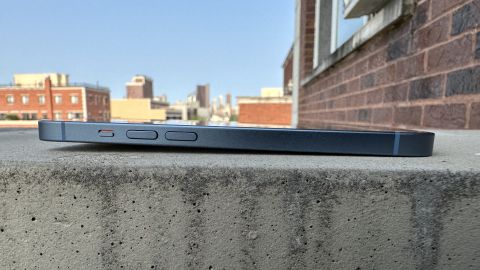
Apple touts the iPhone 14 as having “all-day” battery life, and based on my testing so far, that’s not hyperbole. After a full day where I traveled across states, took tons of photos and did plenty of social media posting, I came home at close to 1 in the morning still with 26 percent battery left to go. All in all, Apple’s latest phone got me through 28 total hours of standard use before I had to plug a charger in, so you can confidently leave your wires at home when you head out for the day.
Very good performance and display — but not the best on an iPhone
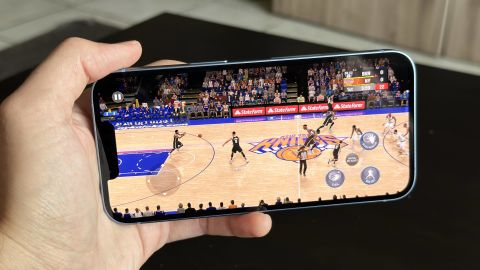
The iPhone 14 is more of the same on the display and performance front, which is to say that it still has a beautiful screen and is still ridiculously fast. Movies and shows looked great on the phone’s 6.1-inch Super Retina XDR display, particularly while taking in the crackling neon blues, reds and yellows that filled the screen during the epic final battle of Obi-Wan Kenobi. The iPhone 14’s display isn’t quite as exciting as that of its Pro counterpart (more on that later), but it remains a fantastic canvas for binging TV and catching up on your TikTok feed.
Playing games on the iPhone 14 was likewise a blast, thanks to a combination of that great screen and a speedy A15 Bionic processor that allowed demanding, console-like titles like Asphalt 9 and NBA 2K22 to run without a hitch. Speaking of performance, I never ran into any slowdown or major issues when taking tons of hi-res pictures or rapidly bouncing between my usual apps like Instagram, Twitter, Discord and Slack.
There’s just one catch: the iPhone 14’s A15 Bionic chip is virtually the same one that debuted in last year’s iPhone 13 series, and not the faster A16 Bionic found in the higher-end iPhone 14 Pro and Pro Max. That likely won’t matter for most people — the new base iPhone zips through everyday tasks with ease — but if you’re a yearly upgrader hoping for a meaningful performance increase, you may be disappointed.
The A15 Bionic did get a slight graphics bump for the iPhone 14 that allows for Cinematic mode videos at 4K and 24 frames per second, as well as better sustained performance for heavy tasks like gaming. But when looking at our benchmark scores, this is more or less the same iPhone from last year on the speed front.
On Geekbench 5 — which gauges overall performance — the iPhone 14 scored nearly identically to the iPhone 13, offering slightly better single-core scores (for simpler tasks) than its predecessor but falling back a bit on multi-core speeds. However, we saw a fairly significant gap between the iPhone 14 and the iPhone 14 Pro on our tests, with the latter phone beating its lower-end sibling by upwards of 100 points. The iPhone 14 is still one of the fastest phones you can buy — and beat out recent flagships like the Galaxy S22 Ultra and OnePlus 10 Pro across the board — but those who want to be as future-proofed as possible for heavy multitasking may want to look towards the Pro.
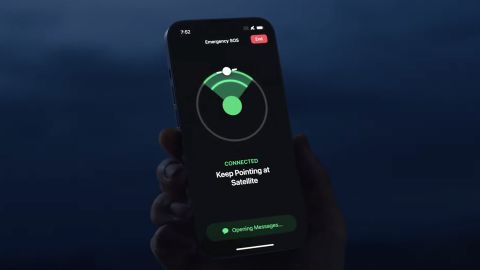
Two of the most significant upgrades to the entire iPhone 14 line are Crash Detection and Emergency SOS — both of which have the potential to save lives in a dire situation.
Available now, Crash Detection uses your phone’s various sensors to detect when you may have been in a car crash, and can automatically contact emergency services as well as your emergency contacts if you’re unresponsive. Emergency SOS via satellite, which is coming in November, allows you to text emergency services via satellite when you’re somewhere without cellular service (we’ve all had that dreaded no signal moment in the countryside, after all). And even if you’re not in a bind, this technology also lets you share your location with family members and friends via Find My for peace of mind while you’re somewhere with spotty signal, such as out on a hike.
I hope I never have to use Crash Detection or Emergency SOS via satellite, but I like knowing my phone is equipped with more tools for keeping me safe. And as someone who’s dealt with frustrating loss of signal at concert venues and in small towns, it can’t hurt to have a new way to let my close contacts know where I’m at.
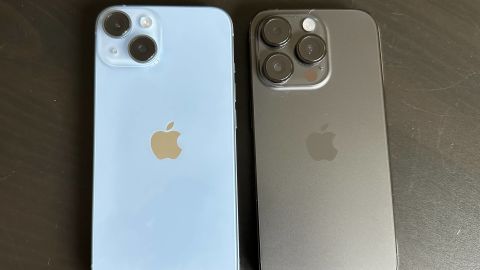
While the iPhone 14 has some great new features — particularly Action mode and the new safety options — it’s easy to imagine the average shopper picking up this device and not being able to tell what’s new over last year’s model. Other than a different range of color options, it looks nearly identical to the iPhone 13, and packs the same processor and display as its predecessor.
The iPhone 14 looks especially iterative when put next to the iPhone 14 Pro, which is one of the biggest leaps forward for the iPhone in quite a while. Apple’s premium iPhone brings some significant upgrades to the mix, including an always-on display for seeing important info at a glance, a massively improved 48-megapixel camera and the awesome Dynamic Island, which is a sleeker front camera module that can morph itself to show you important info. I’ve been testing both phones, and while I’m really enjoying the iPhone 14 (and its lighter weight), I’m reminded of all the cool new stuff I’m missing out on every time I pick up the 14 Pro.
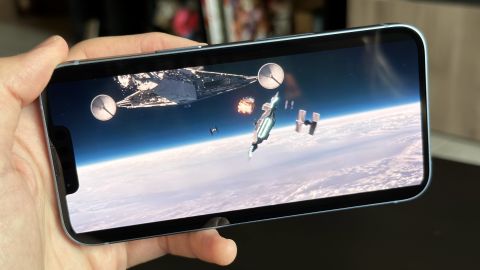
The iPhone 14 is the first iPhone to completely ditch the physical SIM card in favor of eSIM, which is essentially a virtual token that carries your phone number and carrier information. Using eSIM is a breeze, and if you buy your phone through a carrier, it’ll be ready for you right out of the box. Transferring eSIMs between phones is as simple as heading to the settings menu and performing a few taps, and I’ve had no problem bouncing mine between various iPhone 14 models during this review period.
However, the lack of a physical SIM card could prove to be a major pain point for frequent international travelers, as not all international carriers support this new format. That could change quickly — the industry often adapts around Apple’s products — but it might pose an issue overseas right now.
“People using prepaid SIMs and MVNOs that don’t support eSIM will have to wait – likely only a few months, because this is a forcing issue that will have to be addressed quickly,” said Techsponential president and lead analyst Avi Greengart when we asked him about the issue a few weeks back. “Frequent international travelers will need to adopt new habits; instead of buying a prepaid SIM from a kiosk, they’ll buy an eSIM from an app.”
If you’re wondering if your iPhone 14 will support your international plan, you can check out a full list of wireless carriers that currently support eSIM activation here.
| Display |
6.1-inch 2532 x 1170 Super Retina XDR display |
6.1-inch 2556 x 1179 Super Retina XDR display with always-on |
6.1-inch Dynamic AMOLED 2X display with always-on |
|---|---|---|---|
| Refresh rate |
60Hz |
120Hz |
120Hz |
| Processor |
Apple A15 Bionic |
Apple A16 Bionic |
Qualcomm Snapdragon 8 Gen 1 |
| Storage |
128GB / 256GB 512GB |
128GB / 256GB / 512GB / 1TB |
128GB / 256GB |
| Rear camera |
48MP main camera, 12MP ultra-wide camera, 12-megapixel telephoto |
12MP main, 12MP ultra-wide |
12MP ultra-wide, 50MP wide and 10MP telephoto |
| Front camera |
12MP TrueDepth camera |
12MP TrueDepth camera |
10MP |
| Size and weight |
5.78 x 2.82 x 0.31 inches, 6.07 ounces |
5.81 x 2.81 x 0.31 inches, 7.27 ounces |
2.7 x 5.7 x 0.29 inches; 0.37 pounds |
| Colors |
Midnight, Purple, Starlight, (Product) Red, Blue |
Space Black, Silver, Gold, Deep Purple |
Phantom Black, Phantom White, Green, Pink Gold, Bora Purple |
| Price |
$799 |
$799 |
$799 |
The iPhone 14 is more evolution than revolution, and for some buyers, that’ll be perfectly good enough. Apple’s latest entry-level phone takes fantastic pictures, can last all day on a charge and packs a great display, all within a beautiful and lightweight design that feels good to use for hours at a time. And, it’s still faster than the vast majority of phones you can buy, despite not packing Apple’s latest and greatest processor.
Unless you’re really keen on having things like Action mode for video or some promising safety features, most people with an iPhone 13 can skip this year’s iteration. And if you’re willing to invest in something truly new and exciting, the $999 iPhone 14 Pro is a far bigger leap forward, particularly in the display and camera department. Those who want a larger 6.7-inch screen — but not the larger $1,099 price tag of the iPhone 14 Pro Max — can hold out for the $899 iPhone 14 Plus, which has the same features as the standard 14 but on a bigger canvas.
But for everyone else in the “ready to upgrade and looking to spend less than $1,000” camp, and especially those with an iPhone 11 or older, the iPhone 14 is just about the best smartphone that $799 can buy.
